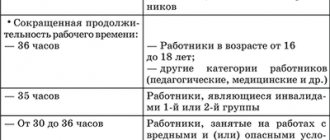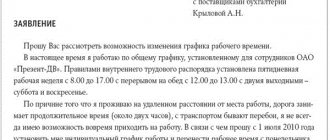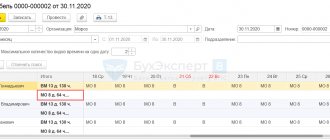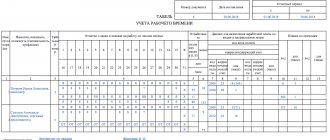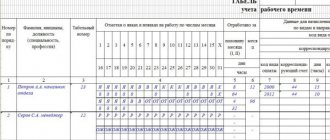Source: Magazine “Human Resources Department of a Commercial Organization”
Sometimes, due to organizational or production issues, it becomes necessary to change the working conditions of company employees. And if it is necessary to change the conditions that concern a specific person, the procedure is clear: an agreement is concluded and the employee works under new conditions, or the procedure established by Art. 74 Labor Code of the Russian Federation. But what should you do if you need, for example, to change the working hours of the entire organization (switch from a shift schedule to a five-day week or vice versa, etc.)? Today we will tell you how to make such a change in the operating mode, and pay attention to the nuances that arise in the process.
Instead of a preface
To begin with, let us recall that working time is the time during which an employee, in accordance with the internal labor regulations and the terms of the employment contract, must perform labor duties, as well as other periods that relate to working time (Article 91 of the Labor Code of the Russian Federation ). By virtue of Art. 100 of the Labor Code of the Russian Federation, the working time regime must provide for:
- length of the working week (five days with two days off, six days with one day off, with days off on a rotating schedule, part-time);
- work with irregular working hours for certain categories of workers;
- duration of daily work (shift), including part-time work (shift);
- start and end times of work, breaks in work, number of shifts per day;
- alternation of working and non-working days, which are established by the internal labor regulations (hereinafter referred to as the Internal Labor Regulations) in accordance with labor legislation, collective bargaining agreements, agreements, and for persons whose working hours differ from the general rules established by a given employer - an employment contract.
According to Art. 57 of the Labor Code of the Russian Federation , the working hours must be specified in the employment contract if it differs from the general rules established by a given employer.
From these norms we can conclude that the working hours are established by internal labor regulations or an employment contract.
For your information
PVTR is a local regulatory act that regulates the procedure for hiring and dismissing employees, the basic rights, duties and responsibilities of the parties to an employment contract, work hours, rest periods, incentives and penalties applied to employees, as well as other issues regulating labor relations with a given employer ( Article 189 of the Labor Code of the Russian Federation ), which is adopted taking into account the opinion of the representative body of workers ( Article 190 of the Labor Code of the Russian Federation ).
As practice shows, working hours can be set in the following ways:
- It is stated directly in the employment contract, as it differs from the general rules defined in the PVTR.
- It is stated in the employment contract, but does not differ from what is established in the PVTR.
- The employee’s working hours are no different from those established in the PVTR and are not specified in the employment contract.
It is not by chance that we named these methods: the procedure for changing the working hours depends on how the condition about it is fixed.
Special types of working hours provided for by the Labor Code are: - work with irregular working hours (Article 101 of the Labor Code); — work in flexible working hours (Article 102 of the Labor Code); — work with the division of the working day into parts (Article 105 of the Labor Code); — shift work (Article 103 of the Labor Code). Irregular working hours are established for a limited number of workers and are determined by the specifics of the labor function performed by the employee, which excludes the possibility of limiting work activities to normal working hours or the implementation of which cannot be accurately recorded in time. It is usually established for the heads of organizations, their deputies, chief specialists, heads of structural divisions of organizations, legal advisers, freight forwarders, etc. The list of such workers is fixed in a collective agreement, agreements or local regulations adopted taking into account the opinion of the representative body of workers. Workers with irregular working hours are subject to labor discipline requirements: they must come to work on time, avoid leaving work early, and observe labor discipline. On a general basis, they are exempt from work on weekends and holidays and take annual leave. The peculiarity of their legal position is that in exceptional cases, in order to fulfill their labor duties by order of the employer, they may be involved in work beyond normal working hours. Overtime is not recognized as overtime work and is compensated by the provision of additional leave in accordance with Art. 119 TK. When working in flexible working hours, the beginning, end or total duration of the working day is determined by agreement of the parties to the employment contract. A flexible working time regime can be introduced at the request of the employee (due to family circumstances, health status, place of residence, etc.). This regime can also be introduced in the interests of the employer, for example, based on the specifics of the organization’s activities. It is often used in trade and public catering with 2-shift, 3-shift or round-the-clock operation of the enterprise. Taking into account the uneven flow of customers during the operation of the enterprise, sliding (tape) schedules are drawn up, in which workers go to work sequentially, in groups or alone at different times in order to ensure normal work in serving the population during rush hour. At different times, workers are given breaks for rest and food and their working day ends. In cases where this is necessary due to the nature of the work, it is allowed to divide the working day into parts, provided that the total working time does not exceed the established norm. This labor regime is introduced to public transport drivers when traffic intensity falls during rush hour, forestry workers, communications workers, housing and communal services workers, etc. This regime is introduced by the employer in a local regulatory act (order or regulation), adopted taking into account the opinion elected trade union body. In organizations working in shift mode, shift schedules are drawn up (Article 103 of the Labor Code). They indicate: the number of shifts, their duration and sequence, the work schedule in each shift, days off, days to complete the missing hours, etc. When drawing up schedules for a certain period, compliance with the established norms of working time and rest time must be ensured. The schedules are drawn up by the employer taking into account the opinion of the employees’ representative body and, as a rule, are attached to the collective agreement. They must be brought to the attention of employees no later than 1 month before their introduction. It is prohibited to assign an employee to work for 2 shifts in a row. It is recommended to change from one shift to another after a day off. For certain categories of workers, taking into account the specifics of the organization’s activities and working conditions, specific labor regimes are established (for teaching staff, maritime and river transport workers, working on a rotational basis, etc.).
Changes by agreement of the parties, if the working hours are established by the employment contract
The working hours can be changed in two ways: either by agreement with the employee ( Article 72 of the Labor Code of the Russian Federation ), or by the employer unilaterally if there are appropriate grounds ( Article 74 of the Labor Code of the Russian Federation ).
Let's take a closer look at them. By virtue of Art. 72 of the Labor Code of the Russian Federation, changes in the terms of an employment contract determined by the parties are allowed only by agreement of the parties, concluded in writing. This method is applicable when the working hours clause is included in the employment contract. Moreover, it does not matter whether the employee’s working hours differ from those established by the PVTR or not.
If employees agree to change the terms of the employment contract, an additional agreement must be concluded with each of them, in which the new working hours must be indicated. Here is an excerpt from the agreement.
| ... 1. State clause 1.4 of the employment contract in the following wording: “The employee is set working hours from 10.00 to 18.00 with a break for rest and food lasting 45 (forty-five) minutes from 13.00 to 13.45.” 2. This agreement comes into force on January 13, 2015. |
Change if operating mode is determined by PVTR
It happens that it is not specific employees who need to change their working hours, but the entire organization.
What to do in this case? Is it enough to accept the PVTR in the new edition (or make a separate document “Changes and additions to the PVTR”)? Good question. Many employers simply approve the new version of the PVTR and introduce them to employees. But this option can only be suitable for a company that employs “one and a half diggers”: it will not be difficult for the employer to find out whether the employees agree or not to change the working hours. But even then, during control and supervisory activities, inspectors may have complaints - after all, familiarization with the PVTR does not mean consent to work in new conditions.
Therefore, we recommend that when changing the essential working conditions enshrined in the PVTR, you still adhere to the procedure provided for in Art. 74 Labor Code of the Russian Federation .
Of course, we can say that Art. 74 of the Labor Code of the Russian Federation is used to change the terms of the employment contract, and not the PVTR. But we believe that when changing the working time regime in the PVTR, it is necessary to be guided by it, since due to the general meaning of labor legislation, including Art. 3 of the Labor Code of the Russian Federation , a different approach to changing the working time regime established in the employment contract and in the PVTR is unacceptable, in particular if they are adopted solely by the employer due to the absence of a representative body of employees.
note
If the PVTR are an annex to the collective agreement, then changes are made to them according to the rules of Art. 44 of the Labor Code of the Russian Federation : in the manner established by the Labor Code for concluding a collective agreement, or in the manner established by a collective agreement.
Let us remind you: according to Art. 74 of the Labor Code of the Russian Federation , when, for reasons related to changes in organizational or technological working conditions (changes in equipment and production technology, structural reorganization of production, etc.), the terms of the employment contract determined by the parties cannot be preserved, they are allowed to change at the initiative of the employer, for with the exception of changes in the employee’s labor function. That is, just the desire to change your work schedule is not enough - there must be objective reasons. The same is stated in paragraph 21 of Resolution No. 2 [1] - the employer will be required to prove the necessity and legality of a unilateral change in the terms of the employment contract due to organizational or technological changes in working conditions. For example, a company purchased new equipment and there was a need to switch from a five-day work week to a shift work schedule.
Thus, A.E. filed a lawsuit for reinstatement in her previous position after dismissal under clause 7 of part 1 of art. 77 Labor Code of the Russian Federation . She motivated her demands by the fact that she worked as a groom, and the employer had no objective reasons to change the work schedule from night shifts to day shifts. When considering the case, the court found that the Equestrian Youth Sports School changed the working hours for grooms in order to optimize the organization of work in connection with organizational and staffing events. In particular, it was necessary to change night shifts to day shifts due to the need to care for horses during the training process and the inability to ensure cleaning and cleaning of stalls at night. Since the employer had reasons for changing significant working conditions, and the employee refused the offered vacancies, the dismissal is lawful ( Appeal ruling of the Moscow City Court dated December 18, 2013 in case No. 11-41997 ).
Irregular working hours
The essence of irregular working hours is the employee’s fulfillment of his duties, instructions from the employer, and additional work outside the main working hours. It is important to take into account the following nuances:
- The list of positions that are subject to the regime of irregular working hours is determined by the company’s collective agreement. The employee must be notified of this at the time of hiring.
- Typically, managers, engineering and administrative employees fall under this mode of work. It is prohibited to involve workers performing physical labor in such activities.
- Lists of positions must be approved by the company's trade union.
- For work under conditions of irregular working hours, the worker is entitled to compensation in the form of additional paid leave (usually up to 7 days).
- Such activities should be periodic and not systematic. Otherwise, this can be considered as overtime hidden by employers. As a rule, the total number of hours of irregular work should indicate the duration of the additional leave provided in the form of compensation.
- Employees can be recruited to work in this mode before the start of the official working day, as well as after its end. Calling an employee to his workplace on his official working day is not considered irregular working hours and must be paid (compensated) separately.
Remember, irregular working hours are considered to be before or after the end of the official working day established by the labor regulations.
Procedure for making changes
Let us consider the procedure for changing the working hours, since its compliance is always verified by the courts when considering a labor dispute.
1. We issue an order to change the working hours and make appropriate changes to the PVTR. Such an order must indicate the reasons for the changes.
Limited Liability Company "Snezhinka"
Order No. 19
October 13, 2014 Vorkuta
About changing working hours
In connection with the re-equipment of the technological line for the production of felt boots and the need to ensure continuity of the production process, on the basis of Art. 74 Labor Code of the Russian Federation
I ORDER:
1. Cancel the current working hours for fulling shop workers.
2. Establish a new operating mode in two shifts:
1st shift – from 7.00 to 15.00 with a break for eating and rest from 11.00 to 11.45;
2nd shift – from 15.00 to 23.00 with a break for eating and rest from 19.00 to 19.45.
3. Approve the internal labor regulations of Snezhinka LLC in a new edition reflecting the changes specified in paragraph 2 of this order and put them into effect from 01/01/2015.
4. The head of the HR department should ensure that the felting shop workers are familiarized with this order no later than October 17, 2014, and within the same period, provide the said employees with written notifications about changes in the terms of the employment contract and internal labor regulations.
Director Galoshin P. P. Galoshin
2. We provide notices to employees about changes in working hours. Such a notice should be given personally against signature to each employee for whom it is planned to change the working hours. The notification must state the reasons that led to the need to change the working hours, and also indicate the consequences of disagreement with continuing work under the new conditions. Please note that if an employee refuses to receive a notification, this must be recorded in the act by reading the notification out loud to the employee. Additionally, you can send this notice to his address written in the employment contract.
An important point is that notification of a change in operating mode is required at least two months before the expected date of introduction of the new operating mode. If this deadline is not met, the court will reinstate the employee to his previous position. So, Ch. filed a lawsuit for reinstatement at work and recovery of wages for forced absence. And here's the thing. Due to production needs and a decrease in the volume of work of the LLC in which Ch. worked, the work schedule from 03/03/2014 was changed to two shifts by order of 01/29/2014. However, the plaintiff was notified of this order only on February 28, 2014, about which there is a corresponding note on the order - Ch. indicated that he did not agree to work in the new conditions. On 03/07/2014 Ch. was offered vacancies available in the LLC, but he refused them and on 03/14/2014 he was fired under clause 7 of part 1 of art. 77 Labor Code of the Russian Federation . The court, considering the case, came to the conclusion that the LLC violated the procedure provided for in Art. 74 of the Labor Code of the Russian Federation , namely, did not notify the employee at least two months before changes in the work schedule, therefore he satisfied the requirements of Ch. ( Appeal ruling of the Supreme Court of the Republic of Tatarstan dated August 25, 2014 in case No. 33‑11668/2014 ).
3. We offer vacancies. If the employee does not agree to work under the new conditions, then the employer is obliged to offer in writing another job available to him (both a vacant position or work corresponding to the employee’s qualifications, and a vacant lower position or lower paid job), which the employee can perform taking into account his condition health ( part 3 of article 74 of the Labor Code of the Russian Federation ). All eligible vacancies available to the employer in the area must be offered. He is obliged to offer vacancies in other localities if this is provided for by the collective agreement, agreements or employment contract.
For your information
Offers of vacancies or other work are best made in writing. This can be done either in a notification about changing working hours or in a separate document.
Please note that you should not offer only vacancies that, in the employer’s opinion, would be suitable for an employee who refused to work under the new regime: the employer does not have the right to selectively offer vacancies, based on his own assumptions about which vacancies are suitable. The courts adhere to this opinion and, in case of violation, reinstate employees. For example, the St. Petersburg City Court reinstated the plaintiff at work only because the OJSC offered only one vacant position similar to the one occupied by the plaintiff, but in a different department. Lower positions were not offered, since the OJSC believed that the employee would not agree to them. By this, the OJSC violated the dismissal procedure, so the plaintiff’s demands were satisfied ( Determination of the St. Petersburg City Court dated March 25, 2014 No. 33‑4368/2014 ).
Here is an example of a job offer.
Limited Liability Company "Snezhinka"
Ref. No. 34 To the felter O. D. Ovtsova
from 11/26/2014
Vacancy Notice
Dear Olga Dmitrievna!
We inform you that as of November 26, 2014, Snezhinka LLC has the following vacancies, which are offered to you in accordance with Art. 74 of the Labor Code of the Russian Federation in connection with refusal to continue work due to changes in working conditions:
- velor worker - salary 15,000 rubles;
- sourman - salary 18,000 rubles.
If you agree to fill one of the proposed vacancies, please contact the HR department with an application for transfer to another job.
Head of HR Department Orlova A.I. Orlova
I have read the notice and received a copy. Ovtsova, November 27, 2014.
4. We conclude an additional agreement. If the employee has agreed to work under the new working hours, an additional agreement is concluded with him if the condition on the working hours was included in the employment contract. If the condition on the working hours was contained only in the PVTR, it is enough to provide a column “Agree/disagree” in the sheet of familiarization with the new edition of this local act - the employee, by writing “Agree” in his own hand and signing, will actually express agreement with the new working mode.
5. We prepare the translation. This step is for those who have accepted the proposed vacancies. Let us remind you that the transfer is formalized by order on the basis of an agreement signed by the parties.
6. We formalize the dismissal. If the employee does not agree to continue working under the new working hours and refuses the offered vacancies (or there are none), a dismissal order is issued. In the column “Bases (document, number, date)” of such an order, you must indicate the details of the notification of changes in working conditions, offers of available vacancies, refusal of offered vacancies and other documents confirming the refusal to work in new conditions.
At the request of the employee, the employer is obliged to provide him with a duly certified copy of the specified order (instruction). In the event that the order cannot be brought to the attention of the employee or he refuses to familiarize himself with it against signature, a corresponding entry is made on the order.
After this, you need to make an entry in the work book, formulating it as follows: “The employment contract was terminated due to refusal to continue work due to a change in the terms of the employment contract determined by the parties, paragraph 7 of part 1 of Article 77 of the Labor Code of the Russian Federation.”
In addition, do not forget to take other steps to formalize the dismissal - fill out a personal card, issue wages and a work book and the documents necessary for the employee.

